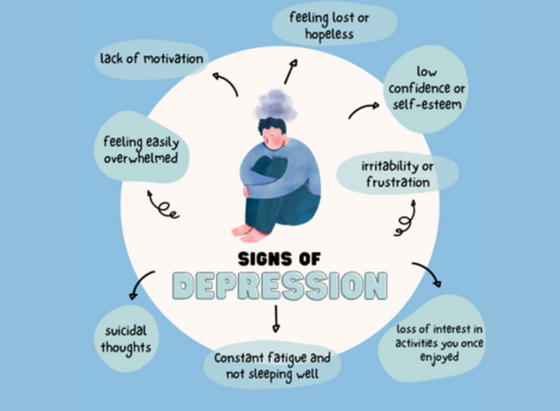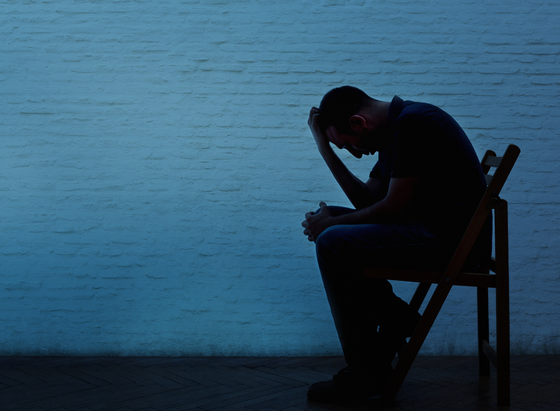Depression and addiction

Written by:
Last Updated:
May 2nd, 2024
It is common for those with depression to struggle with co-occurring disorders like addiction, turning to certain substances or behaviours to temporarily relieve symptoms associated with their mental health. Here we highlight the signs of mental health and addiction, how depression and addiction impact one another and what to do if you or a loved one requires support to start on the road to recovery.
What is depression?
We can all feel a little down from time to time, being less motivated than usual or struggling to think as positively as we normally do. This feeling is perfectly natural and is often in response to environmental triggers or external events.
In contrast, depression is a mood disorder which involves persistently negative thoughts or emotions that can alter thoughts and behaviours. A good way to visualise depression is like a dark cloud, enveloping the person within it and making them feel helpless under the weight of their negative emotions. Depression can interfere with all aspects of a person’s life and has the potential to severely impact their ability to perform everyday tasks like work, socialising, or even taking care of personal hygiene. While sadness is usually a temporary condition, depression can be far more prolonged, especially when left untreated. Some individuals find themselves crippled under the weight of their depression, feeling that the only way they can face the world is to engage with addictive substances as a way to numb the pain and become more functional in everyday life. This can lead to addiction as the person tries to dilute negative emotions.
Depression comes in a variety of different forms, and while there is no way of determining exactly how each person who deals with depression is going to feel. Some common depression symptoms include the following:
- Feeling lost or helpless
- Lack of motivation
- Feeling easily overwhelmed
- Suicidal thoughts
- Constant fatigue and not sleeping well
- Loss of interest in activities you once enjoyed
- Irritability or frustration
- Low confidence or self-esteem
What is depression?
If you are worried that you or a loved one is struggling with both addiction and depression, look to the statements below. If you feel that any of them resonate with you, this might suggest a dual diagnosis.
- I have lost interest in hobbies or activities that I once enjoyed.
- My friends and loved ones are concerned for my welfare.
- I partake in addictive behaviours to get me through the day.
- I feel hopeless and that others would prefer it if I weren’t around.
- I have tried to stop taking addictive substances in the past but have failed to do so.
- I struggle to keep my focus, either at school or work.
How does depression lead to addiction?
Addiction is a condition that alters the way a person sees the world, instilling them with a compulsive need to seek out addictive substances or behaviours, even if it is having a dangerous impact on their mental and physical health. Those with depression can be at a heightened risk of developing an addiction, and some of the reasons for this include:
To self-soothe.
Navigating a condition like depression, along with all the negative feelings it evokes, can be very difficult and overwhelming to manage alone. For some, they can find their depressive symptoms too much to handle, turning to addictive substances to alleviate their pain or distract them from their mental health.
Another symptom associated with depression is loneliness, and those with the condition often feel isolated from the world, even if they are in a room surrounded by people. Addictive substances can act as an emotional crutch, a way to disassociate from their condition and find temporary relief.
To become more functional.
Depression can make tasks that were once simple incredibly difficult, bringing with it intense fatigue or a lack of energy. To handle symptoms as challenging as this, substances like alcohol or drugs can offer a jolt of vitality, providing those with the condition a chance to become more productive and handle the necessary tasks of everyday life.
To cope with life’s pressures.
Sometimes, addiction can stem from poor coping strategies, with individuals unable to effectively manage some hurdles that might present themselves. Some of these could include:
- Losing a job
- Breaking up with a partner
- Moving home
These incidents can be a trigger for those with depression, spurring them to take part in reckless or dangerous activities to ease the pain, such as alcohol or substance abuse.
Is depression a risk factor of addiction?
Yes. Depression is a risk factor of addiction because each of the conditions can perpetuate and exacerbate the other. For example, while addictive substances can distract people from their depression, momentarily making them feel slightly more elevated, this feeling is only short-lived, and will only make the problem worse in the long term. Feelings of sadness, loneliness, and detachment can be intensified by addiction, and as the condition progresses, it can seem increasingly challenging to break this dangerous cycle of self-medication.
Misconceptions about depression and addiction
‘You can snap out of depression just like you can stop using addictive substances.’
For those who do not struggle with their mental health, it might seem simple enough to get through the tasks of daily life, not able to comprehend why this might not come as easy for other people. However, both depression and addiction are not things that can simply be switched off or avoided; they are serious conditions which require a great deal of support and bravery to face head-on.
‘Addiction and depression are both untreatable.’
Due to the severity and symptoms associated with depression and addiction, many individuals assume that they are untreatable illnesses. However, by utilising a combination of talking therapies, self-help and, in some cases, medication to ease these more uncomfortable emotions, both conditions can greatly benefit from the appropriate treatment.
‘Talking about things will only make it worse.’
A lot of people associate therapy with letting your guard down, expressing some of your most intimate thoughts to immediately be sent away. However, this could not be further from the truth. Psychotherapy can be an intensely valuable tool in gaining a deeper insight into mental health, exploring some of your feelings and developing healthier ways to tackle them in the future.
How are co-occurring disorders treated?
If you believe that you are beginning to exhibit signs of addiction alongside a diagnosis of depression, it is important that you seek treatment for managing your mental health in better ways, freeing yourself from these addictive tendencies and starting on the road to healing.
When treating depression and addiction, the first step to any effective treatment plan comes with addressing your primary disorder. This simply refers to whichever condition has fuelled or given rise to the other. For example, if your depression can become so severe that you turn to addictive behaviours just to cope, this means that depression is likely your primary disorder. In this case, it is crucial that before starting addiction treatment your mental health is stable enough to begin addressing these conditions collectively.
At Sanctuary Lodge, our rehab has access to a variety of scheduled activities and therapeutic interventions, all designed to help you feel as safe and comfortable as possible over the course of your stay. Some of the treatments we provide that have proven beneficial for both depression and addiction include:
Group therapy. Depression and addiction thrive in isolation, and it is only through the continued support and companionship of others that we can begin to see the wood for the trees. By engaging with group therapy at Sanctuary Lodge, you will be surrounded by others who, just like you, are looking to work through their issues and start on a healthier path.
Psychotherapy. Negative patterns of thinking can be a huge influence in the exacerbation of mental health problems, and it is only by understanding and challenging these thoughts firsthand that we can begin to overcome our addiction. For this reason, therapies such as Cognitive Behavioural Therapy (CBT) are incredibly beneficial, offering a fresh perspective that can be far more positive.
Start your recovery today
If you are living under the immense weight of depression, our team sympathise with your struggles, and we understand how especially challenging it can feel to keep this illness under control alongside active addiction. However, something we can assure you is that, with the right support, this often makes all the difference. We have seen many clients walk through the doors of our centre feeling overwhelmed and hopeless, leaving with a fresh perspective and a new support system to keep them focused on their goals. If you would like any information about what Sanctuary Lodge can offer you in your own personal journey, please do not hesitate to contact a member of our team right away.





